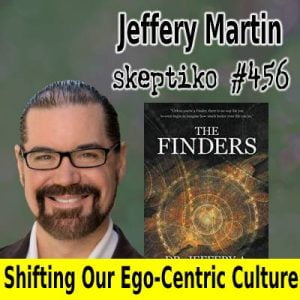Dr. Jeffery Martin’s Vision for a Well-Being Centric Culture: A Deep Dive
 In a compelling episode of “Dr. Jeffery Martin, Can He Transition Our Ego-Centric Culture? |456|” hosted by Alex Tsakiris on the Skeptiko podcast, Dr. Jeffery Martin shares his thought-provoking insights on transitioning from an ego-centric culture to one centered on fundamental well-being. This article delves into the key points of the first 30 minutes of their discussion, expanding on the areas of disagreements and debates that surface.
In a compelling episode of “Dr. Jeffery Martin, Can He Transition Our Ego-Centric Culture? |456|” hosted by Alex Tsakiris on the Skeptiko podcast, Dr. Jeffery Martin shares his thought-provoking insights on transitioning from an ego-centric culture to one centered on fundamental well-being. This article delves into the key points of the first 30 minutes of their discussion, expanding on the areas of disagreements and debates that surface.
1. Influence of Personal Experiences and Religious Background
Dr. Martin’s conversation begins with a reflection on his personal journey, highlighting the impact of intense religious experiences from his upbringing. This background shapes his perspective and approach, suggesting a unique blend of spiritual and scientific worldviews. The debate here lies in how personal experiences and spiritual backgrounds influence one’s professional and academic pursuits, a topic that often garners varying opinions.
2. Critical View on Global Advertising and Economic Structures
The discussion takes a critical turn as Dr. Martin voices concerns about the implications of his work on the global advertising industry. He challenges the current consumerist and economic structures, pointing out a potential conflict between transformative personal growth and the demands of a market-driven society. This segment of the conversation sparks a debate on the compatibility of individual well-being with the mechanisms of global capitalism.
3. The Course’s Foundations: Gathering Diverse Expertise
Dr. Martin discusses the origins of his course, aimed at mindset transformation. He compares his method to learning from the best in various fields, suggesting an approach rooted in diverse expert insights. The effectiveness of this methodology in fostering a fundamental cultural shift becomes a point of debate, questioning the feasibility of such comprehensive learning methods.
4. Integrating Transformative Experiences into Everyday Life
Central to the conversation is the topic of integrating life-changing experiences, like near-death experiences, into everyday life. Dr. Martin proposes that his course offers a safer, more gradual path to this integration. The debate here revolves around the effectiveness of structured courses versus spontaneous, profound personal experiences in achieving lasting transformation.
5. Balancing Fundamental Well-Being and Societal Expectations
Dr. Martin acknowledges the difficulty in shifting towards a culture focused on fundamental well-being, given societal constraints and responsibilities. This part of the discussion highlights the tension between pursuing individual well-being and adhering to societal norms, sparking a debate on the practicality of such a cultural transition.
6. The Role of Technology in Cultural Transformation
The role of technology in aiding the shift towards a well-being-centric culture is another significant topic. While Dr. Martin appears optimistic about the potential of technology in this process, this optimism can be contentious, considering the complex impacts of technology on society and individual well-being.
7. Critique of the Scientific Method and Peer Review Process
Dr. Martin discusses the limitations and biases inherent in the scientific method and the peer review process. His critique indicates a deeper disagreement with traditional approaches in the scientific community, opening a debate on the validity and reliability of current scientific validation processes.
In conclusion, Dr. Jeffery Martin’s interview on the Skeptiko podcast with Alex Tsakiris presents a nuanced discussion on the cultural shift towards fundamental well-being. The conversation challenges existing societal, economic, and scientific norms, inviting listeners to rethink the status quo. Dr. Martin’s insights offer a unique perspective on the potential for personal and collective transformation in today’s world.





